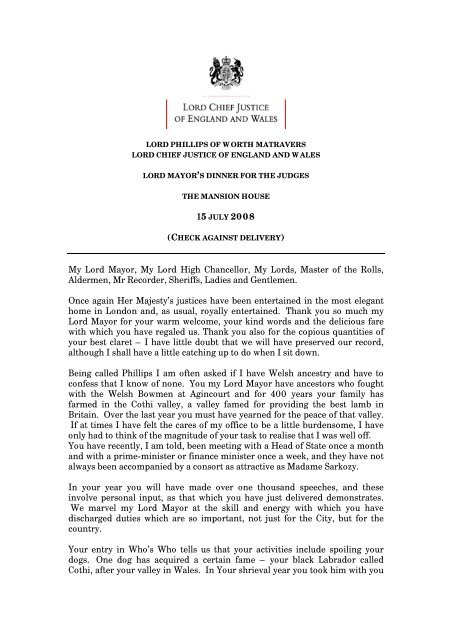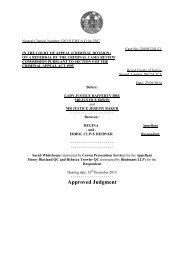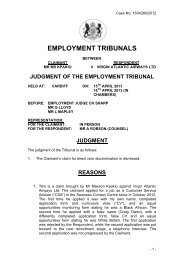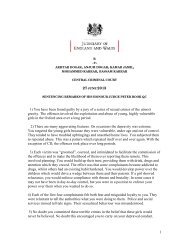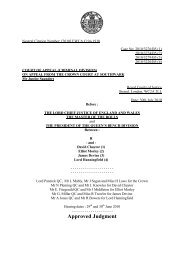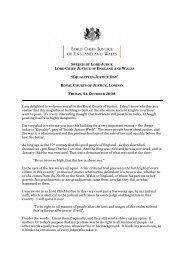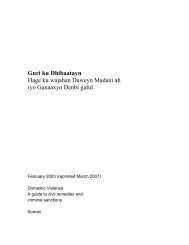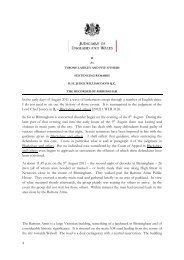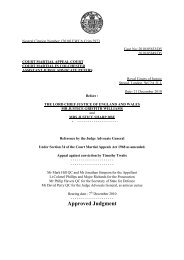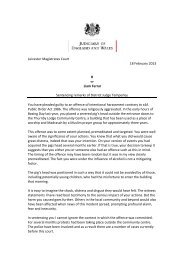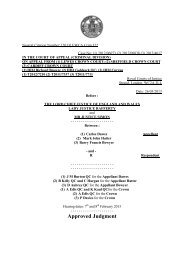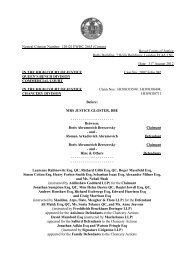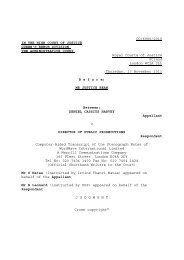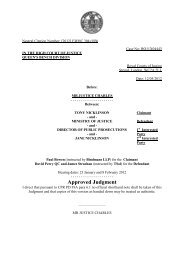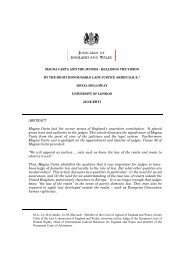Speech by Lord Phillips of Worth Matravers, Lord - Judiciary
Speech by Lord Phillips of Worth Matravers, Lord - Judiciary
Speech by Lord Phillips of Worth Matravers, Lord - Judiciary
Create successful ePaper yourself
Turn your PDF publications into a flip-book with our unique Google optimized e-Paper software.
LORD PHILLIPS OF WORTH MATRAVERS<br />
LORD CHIEF JUSTICE OF ENGLAND AND WALES<br />
LORD MAYOR’S DINNER FOR THE JUDGES<br />
THE MANSION HOUSE<br />
15 JULY 2008<br />
(CHECK AGAINST DELIVERY)<br />
My <strong>Lord</strong> Mayor, My <strong>Lord</strong> High Chancellor, My <strong>Lord</strong>s, Master <strong>of</strong> the Rolls,<br />
Aldermen, Mr Recorder, Sheriffs, Ladies and Gentlemen.<br />
Once again Her Majesty’s justices have been entertained in the most elegant<br />
home in London and, as usual, royally entertained. Thank you so much my<br />
<strong>Lord</strong> Mayor for your warm welcome, your kind words and the delicious fare<br />
with which you have regaled us. Thank you also for the copious quantities <strong>of</strong><br />
your best claret – I have little doubt that we will have preserved our record,<br />
although I shall have a little catching up to do when I sit down.<br />
Being called <strong>Phillips</strong> I am <strong>of</strong>ten asked if I have Welsh ancestry and have to<br />
confess that I know <strong>of</strong> none. You my <strong>Lord</strong> Mayor have ancestors who fought<br />
with the Welsh Bowmen at Agincourt and for 400 years your family has<br />
farmed in the Cothi valley, a valley famed for providing the best lamb in<br />
Britain. Over the last year you must have yearned for the peace <strong>of</strong> that valley.<br />
If at times I have felt the cares <strong>of</strong> my <strong>of</strong>fice to be a little burdensome, I have<br />
only had to think <strong>of</strong> the magnitude <strong>of</strong> your task to realise that I was well <strong>of</strong>f.<br />
You have recently, I am told, been meeting with a Head <strong>of</strong> State once a month<br />
and with a prime-minister or finance minister once a week, and they have not<br />
always been accompanied <strong>by</strong> a consort as attractive as Madame Sarkozy.<br />
In your year you will have made over one thousand speeches, and these<br />
involve personal input, as that which you have just delivered demonstrates.<br />
We marvel my <strong>Lord</strong> Mayor at the skill and energy with which you have<br />
discharged duties which are so important, not just for the City, but for the<br />
country.<br />
Your entry in Who’s Who tells us that your activities include spoiling your<br />
dogs. One dog has acquired a certain fame – your black Labrador called<br />
Cothi, after your valley in Wales. In Your shrieval year you took him with you
to the Old Bailey, to stand guard outside the door <strong>of</strong> the sheriff’s flat. Alas,<br />
you failed to lend Cothi to your successor. The sad consequence was that his<br />
flat, within the Old Bailey, was burgled earlier this year. I understand that it is<br />
no longer the practice <strong>of</strong> the Old Bailey Judges to grant bail over the lunch<br />
adjournment within the precincts <strong>of</strong> the court.<br />
As you have remarked, this is the last time that I shall have the privilege <strong>of</strong><br />
making this speech, and it is natural to look back and to look forward. I took<br />
up <strong>of</strong>fice with the prospect <strong>of</strong> the constitutional changes that, after<br />
negotiations led on behalf <strong>of</strong> the judiciary <strong>by</strong> <strong>Lord</strong> Woolf, had been embodied<br />
in the Concordat and subsequently the Constitutional Reform Act 2005.<br />
The implementation <strong>of</strong> those changes did not, at first, proceed without<br />
problems. Some aspects <strong>of</strong> the new procedure for making judicial<br />
appointments proved unduly bureaucratic, giving rise to excessive delays and<br />
to uncertainty for candidates. Lessons have been learnt, procedural changes<br />
have been made, and causes <strong>of</strong> delay removed. Furthermore successful<br />
candidates for the High Court and Circuit Bench will now be told with<br />
certainty that they will receive a judicial appointment, rather than being told<br />
that this would depend upon whether a suitable vacancy occurred.<br />
The Judicial Appointments Commission was given a very difficult task,<br />
without any trial or shadow period, being expected to hit the ground running<br />
at a time when, because <strong>of</strong> the possibility that they might be required to<br />
relocate outside London, they were having great difficulty in recruiting and<br />
retaining adequate staff.<br />
They and their Chair, Usha Prashar are to be congratulated on the way that<br />
they have faced and overcome their difficulties.<br />
The Act requires the JAC to appoint on merit but to do their best to attract a<br />
more diverse pool from which such appointments will be made. Some,<br />
unrealistically, expected an immediate increase in the diversity <strong>of</strong><br />
appointments made.<br />
This is <strong>of</strong> significant importance, and great efforts have been and are being<br />
made to attract more ethnic minority candidates and more women candidates<br />
<strong>of</strong> the necessary calibre to apply to become judges. My <strong>Lord</strong> Mayor, you have<br />
rightly emphasised the importance <strong>of</strong> this. I have reason to believe that as<br />
appointments to the bench are made consequent upon the recent High Court<br />
Competition you will discover that these efforts are beginning to bring their<br />
reward.<br />
Another area where there were originally problems was the relationship<br />
between the Court Service and the judiciary. We were concerned that we were<br />
not properly involved in the determination <strong>of</strong> the funding needed <strong>by</strong> the Court<br />
Service and that, if the necessary funds were agreed, they were at risk <strong>of</strong> being<br />
cut back to help to meet overspend in other areas <strong>of</strong> the Departments<br />
activities.<br />
Quite apart from this it had not been established that the Court Service owed<br />
allegiance not just to the <strong>Lord</strong> Chancellor but also directly to the judiciary.<br />
Over the last year these concerns have been allayed <strong>by</strong> the negotiation <strong>of</strong> the
Framework Document that makes provision for the safeguarding <strong>of</strong> the<br />
funding <strong>of</strong> the Court Service and its independence from interference in day to<br />
day management and makes it clear that its members owe duties both to the<br />
<strong>Lord</strong> Chancellor and to the judiciary. This is reflected <strong>by</strong> the new structure <strong>of</strong><br />
the Court Service under a Board on which the judiciary is properly<br />
represented.<br />
The terms <strong>of</strong> that document would not have been agreed without the<br />
constructive attitude <strong>of</strong> the <strong>Lord</strong> Chancellor, Jack Straw and <strong>of</strong> Suma<br />
Chakrabarti, his Permanent Secretary, who have, if I may say so, been a great<br />
pleasure to work with. They have made it plain that they welcome the active<br />
involvement <strong>of</strong> the judiciary, as partners, in the efficient and effective<br />
operation <strong>of</strong> the courts.<br />
They have also accepted that, if we are to play our part, those judges, and<br />
there are now quite a lot <strong>of</strong> them, who have administrative responsibilities,<br />
must be provided with the assistance that they need to discharge these<br />
without undue encroachment on their primary task <strong>of</strong> sitting as judges.<br />
By the end <strong>of</strong> March the Court Service intends to put forward proposals for the<br />
provision <strong>of</strong> this assistance.<br />
I have remained concerned <strong>by</strong> some ill-informed attacks on individual<br />
members <strong>of</strong> the judiciary, in particular in relation to the grant <strong>of</strong> bail. Statute<br />
defines the circumstances in which it is mandatory to grant bail and it is<br />
inevitable that, on occasion, a defendant who has been granted bail, will<br />
commit a serious <strong>of</strong>fence while on bail. This is not something that the media<br />
all appreciate.<br />
We now have a small team <strong>of</strong> judges, who have received media training, and<br />
who are available to provide informed and authoritative correction where this<br />
is desirable. They have to date been called on to do this on four occasions.<br />
Sentencing used to be relatively straightforward for a judge, albeit never an<br />
easy task. It is so no more. As a magistrate you will, my <strong>Lord</strong> Mayor, be only<br />
too well aware <strong>of</strong> this.<br />
The frequent intervention <strong>of</strong> Parliament has beset sentencing with so many<br />
statutory requirements that it has become something <strong>of</strong> a nightmare.<br />
That intervention has recently been having effects on the prison population<br />
that we are told were not intended. I believe that Parliament and the judges<br />
each have a role to play in producing a sentencing regime which makes proper<br />
provision for both punishment and rehabilitation. I also believe that<br />
Parliament has, in the past responded, to perceived public concern about<br />
crime <strong>by</strong> legislation the implications <strong>of</strong> which have not been properly<br />
considered.<br />
For this reason I was happy to agree that <strong>Lord</strong> Justice Gage should chair a<br />
working group set up to consider proposals for a Sentencing Commission that<br />
might assist Parliament to be better informed in this area. Some proposals<br />
went so far as to suggest that we judges should be imprisoned in a kind <strong>of</strong><br />
sentencing grid, where all we would need would be particulars <strong>of</strong> the <strong>of</strong>fence,
some data about the defendant’s antecedents and a calculator to arrive at a<br />
specific and predictable sentence.<br />
Happily the working group has rejected such proposals, but it has suggested<br />
that the Sentencing Guidelines Council be given access to the necessary<br />
statistical data – data that is not presently available – so that it will be in a<br />
position to inform Parliament <strong>of</strong> the resource implications <strong>of</strong> the guidelines<br />
that it publishes and <strong>of</strong> any proposed change in the sentencing regime.<br />
I commend the Report, produced under exacting time constraints and hope<br />
that it will receive proper consideration <strong>by</strong> all Parties.<br />
I have now finished looking backwards and am looking forwards. You had my<br />
<strong>Lord</strong> Mayor the distinction <strong>of</strong> being for six years the senior partner <strong>of</strong> Norton<br />
Rose, one <strong>of</strong> the giants in the firmament <strong>of</strong> the City law firms. You have<br />
mentioned the vital contribution that commercial law and commercial lawyers<br />
make to the prosperity <strong>of</strong> this country, and I hope that the Senior Salaries<br />
Review Body will take note <strong>of</strong> the contribution that commercial law makes to<br />
the prosperity <strong>of</strong> the partners <strong>of</strong> the six big city firms.<br />
For over a century our Commercial Court has provided a service <strong>of</strong> dispute<br />
resolution that has made it the forum <strong>of</strong> choice for contracting parties around<br />
the world. The inordinate length <strong>of</strong> the earlier stages <strong>of</strong> he BCCI litigation –<br />
the latter stages were never reached – led the Court to conclude that it was<br />
time it reviewed its procedures.<br />
Last December a report was published that was the product <strong>of</strong> the cooperation<br />
between the judiciary, lawyers and court users that has always<br />
characterised the Commercial Court.<br />
It made proposals for the reform <strong>of</strong> the court’s procedures and, in particular,<br />
<strong>of</strong> the management <strong>of</strong> the really heavy cases that are brought before it. The<br />
proposed reforms are now being piloted and I am hopeful that they will mark<br />
a new and dynamic chapter in the history <strong>of</strong> the Court.<br />
It has long been recognised that the Commercial Court has another urgent<br />
need, and that is a modern building with facilities worthy <strong>of</strong> the business<br />
conducted in it. The antithesis, in short, <strong>of</strong> the disgraceful accommodation in<br />
St Dunstan’s House. The City, particularly under the leadership <strong>of</strong> Sir Robert<br />
Finch when he was <strong>Lord</strong> Mayor, put its weight behind the demand for this and<br />
I am happy to say that it is now in the course <strong>of</strong> construction.<br />
The new Rolls building, to open in 2010, will accommodate not only the<br />
Commercial Court but the Chancery Division and the Technology and<br />
Construction Court. It will thus bring together important areas <strong>of</strong> commercial<br />
litigation that so <strong>of</strong>ten overlap in a working environment that is worthy <strong>of</strong> the<br />
City <strong>of</strong> London.<br />
It is rare at this dinner, which brings together the <strong>Lord</strong> Chief Justice and the<br />
<strong>Lord</strong> Chancellor, that the former does not take the opportunity to say a word<br />
about resources, and I fear that this evening will be no exception. First a<br />
positive comment.
It is remarkable and commendable how the legal fraternity, and many outside<br />
that fraternity, are giving their services and sometimes reaching into their<br />
pockets, to compensate for deficiencies <strong>of</strong> public funding. I speak <strong>of</strong> the<br />
increasing numbers <strong>of</strong> lawyers who give their services ‘pro bono’. I speak <strong>of</strong><br />
the Sheriffs and Recorders Fund, where so many whose duties include sending<br />
<strong>of</strong>fenders to prison show their humanity <strong>by</strong> funding the supply <strong>of</strong> the bare<br />
necessities that many <strong>of</strong>fenders lack when they come out <strong>of</strong> prison. I speak <strong>of</strong><br />
the numbers, doubling year <strong>by</strong> year, who join in the London Legal Walk. This<br />
year some 3,300 walkers raised about £325,000 for those charities that<br />
provide assistance and advice to litigants in person. And I pay particular<br />
tribute to the City solicitors, whose support is so critical to these ventures.<br />
I have to tell you that ‘pro bono’ assistance is now being sought at the highest<br />
levels. A couple <strong>of</strong> months ago I received a letter from a Member <strong>of</strong><br />
Parliament, to whom, I propose to accord anonymity and to whose constituent<br />
I shall give a nom de plume. It read as follows:<br />
“I am writing on behalf <strong>of</strong> my constituent, Mr Johnson, <strong>of</strong> the above<br />
address, on the issue <strong>of</strong> his desire to appeal against a recent court<br />
ruling that was made against him. Mr Johnson believes that <strong>by</strong> not<br />
being permitted to pursue this matter through appeal he is being<br />
discriminated against.<br />
Having known Mr Johnson for some time I would like to <strong>of</strong>fer this<br />
letter <strong>of</strong> support on his behalf. I have always found Mr Johnson to be <strong>of</strong><br />
sound mind and character and would like to see all appropriate legal<br />
assistance made available to him. I would greatly appreciate your<br />
giving Mr Johnson’s complaint full consideration and forwarding me<br />
any information regarding the options that are currently open to him in<br />
pursuing his right to appeal further. Please find enclosed the<br />
voluminous documentation that relates to this matter”.<br />
‘Pro bono’ assistance is no substitute for the basic funding requirements <strong>of</strong> an<br />
efficient justice system. Looking ahead there are real concerns as to whether<br />
we are going to achieve that funding. Funding that enables us to stand still is<br />
not enough. There are areas where we must move forward. Almost more<br />
important than anything else is the implementation <strong>of</strong> a new strategy for<br />
judicial education that has been prepared with great care <strong>by</strong> the Judicial<br />
Studies Board.<br />
This will ensure the training and support that is needed for those who are<br />
appointed to the bench, and continuing education that is tailored for the needs<br />
<strong>of</strong> the individual judge. You have, my <strong>Lord</strong> Mayor, a special interest in<br />
education and have said that a good education is priceless.<br />
A good judicial education has a price – the new strategy will bring a<br />
considerable increase in expenditure – but it is a price that must be paid. I am<br />
well aware that we are in a period <strong>of</strong> financial stringency, but I am relying on<br />
the <strong>Lord</strong> Chancellor to fight with us to ensure that we can afford to modernise<br />
and improve our judicial education, for we cannot afford not to.
I would like to end <strong>by</strong> mentioning two people. First <strong>Lord</strong> Bingham <strong>of</strong> Cornhill<br />
who, for four years gave this speech at this dinner with memorable elegance<br />
and who has led the Law <strong>Lord</strong>s for the past eight years. Tom Bingham is the<br />
great lawyer <strong>of</strong> our generation. From the time that the Bar was robbed <strong>of</strong> his<br />
talents <strong>by</strong> his early promotion to the Bench, his lucid and learned judgments<br />
have fashioned the development <strong>of</strong> the common law in this jurisdiction and<br />
upheld the rule <strong>of</strong> law in the face <strong>of</strong> challenges unprecedented since the last<br />
war. He has been a powerful advocate both <strong>of</strong> the Human Rights Act and <strong>of</strong><br />
the Supreme Court.<br />
It is sad that the time that has been needed to prepare the Supreme Court<br />
building has prevented him from presiding there. We are all indebted to him.<br />
Finally, I turn to the man who will be making this speech next year – Sir Igor<br />
Judge. I would like to take this opportunity publicly to thank Igor for the<br />
support and encouragement that he has given me over the last three years,<br />
and particularly the load that he has shouldered as the Head <strong>of</strong> Criminal<br />
Justice. We have worked shoulder to shoulder together and I have leant on<br />
his. Igor has all the experience and all the attributes, including that most<br />
important quality <strong>of</strong> humanity, to make an outstanding <strong>Lord</strong> Chief Justice. I<br />
wish him well.<br />
Please note that speeches published on this website reflect the individual<br />
judicial <strong>of</strong>fice-holder's personal views, unless otherwise stated. If you<br />
have any queries please contact the Judicial Communications Office.


